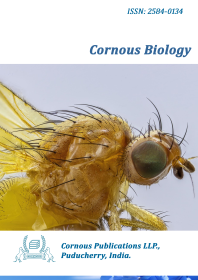

Background: Rice is one of the most significant cereal crops in Nepal in terms of area of cultivation, production, and productivity. One major limiting factor for the production of rice is scarcity of moisture at critical stages. The study aims to understand the relationship of yield and yield-attributing traits, adaptability, and stability of elite rice genotypes under irrigated and moisture restricted environments.
Methods: A randomized complete block design was used for the experiment at IAAS Paklihawa Nepal consisting of nine rice genotypes taken from Hardinath, NRRP.
Results: The percent reduction in effective panicles per m², plant height, and grain yield under moisture-restricted conditions compared to irrigated conditions was 22%, 8%, and 24%, respectively. Stress tolerance indices showed that IR17L1387, IR16L1713, and IR16L1801 had the highest STI, indicating their potential for cultivation under moisture-restricted conditions. GGE biplot analyses (Which-Won-Where and Mean vs. Stability) demonstrated that Sukhadhan 3 was the most stable genotype across both environments. Additionally, IR16L1713 and IR17L1387 were identified as the winning genotypes under moisture-restricted and irrigated environments, respectively.
Conclusion: The current study concluded that the most valuable option for increasing yield would be to choose one trait effective panicle per meter square and Sukhadhan 3 was the most stable genotype under both environments.
biplot, stability, stress tolerance, irrigated, rice
Bishwas, K. C., Poudel, M. R., & Regmi, D. (2021). AMMI and GGE biplot analysis of yield of different elite wheat line under terminal heat stress and irrigated environments. Heliyon, 7(6), e07206. https://doi.org/10.1016/J.HELIYON.2021.E07206
Leng, G., & Hall, J. (2019). Crop yield sensitivity of global major agricultural countries to droughts and the projected changes in the future. Science of the Total Environment, 654, 811–821. https://doi.org/10.1016/j.scitotenv.2018.10.434
Nahar, S., Kalita, J., Sahoo, L., & Tanti*, B. (2016). Morphophysiological and molecular effects of drought stress in rice. Annals of Plant Sciences, 5(09), 1409. https://doi.org/10.21746/aps.2016.09.001
NPC. (2019). The Fifteenth Plan (2076/77-2080-81) National Planning Commission, Government of Nepal Kathmandu Nepal. 1–418. https://npc.gov.np/images/category/15th_plan_English_Version.pdf
Pokhrel, A., Dhakal, S., Kafle, R., & Pokhrel, A. (2021). Adoption status of improved production technology in rice cultivation in Kanchanpur, Nepal. Archives of Agriculture and Environmental Science, 6(2), 178–185. https://doi.org/10.26832/24566632.2021.060209
Poudel, M., Ghimire, S., Prasad Pandey, M., Dhakal, K., Bahadur Thala, D., and Kumari Paudel, H. (2020). Evaluation of Wheat Genotypes under Irrigated, Heat Stress and Drought Conditions. Journal of Biology and Today’s World, 9(1),1–003.
Poudel, M. R., Ghimire, S., Prasad, P., Dhakal, K. H., Thapa, D. B., and Poudel, H. K. (2020). Evaluation of Wheat Genotypes under Irrigated,Heat Stress and Drought Conditions, 9(1), 212.
Poudel, M. R., Ghimire, S. K., Pandey, M. P., Dhakal, K. H., Bahadur Thapa, D., & Khadka, D. K. (2019). Assessing genetic diversity for drought and heat stress tolerance of Nepalese wheat genotypes by SSR markers. EurAsian Journal of BioSciences Eurasia J Biosci., 13, 941–948.
Poudel, M. R., Poudel, P. B., Puri, R. R., and Paudel, H. K. (2021). Variability, Correlation and Path Coefficient Analysis for Agro-morphological Traits in Wheat Genotypes (Triticum aestivum L.) under Normal and Heat Stress Conditions. International Journal of Applied Sciences and Biotechnology, 9(1), 65–74. https://doi.org/10.3126/ijasbt.v9i1.35985
Poudel, M. R., & Poudel, H. K. (2016). Genetic variability, heritability and genetic advance of yield attributing traits in winter maize. Int. J. Grad. Res. Rev., 1(1), 9-12.
Poudel, P. B., Poudel, M. R., & Puri, R. R. (2021). Evaluation of heat stress tolerance in spring wheat (Triticum aestivum L.) genotypes using stress tolerance indices in western region of Nepal. Journal of Agriculture and Food Research, 5, 100179. https://doi.org/10.1016/j.jafr.2021.100179
Shrestha, N., Poudel, A., Sharma, S., Parajuli, A., Budhathoki, S., & Shrestha, K. (2018). Correlation Coefficient and Path Analysis of Advance Rice Genotypes in Central Mid-hills of Nepal. International Journal of Research in Agricultural Sciences, 5(3), 150–154.
Tiwari, D. N., Tripathi, S. R., Tripathi, M. P., Khatri, N., & Bastola, B. R. (2019). Genetic Variability and Correlation Coefficients of Major Traits in Early Maturing Rice under Rainfed owland Environments of Nepal. Advances in Agriculture, 2019. https://doi.org/10.1155/2019/5975901
Vaiknoras, K., Economic, U., Larochelle, C., Tech, V., Alwang, J., & Tech, V. (2021). How adoption of drought tolerant rice varieties impacts households in a non- drought year : Evidence from Nepal.
World Bank. (2020). Nepal - Irrigation and drainage development project. Retrieved from https://projects.worldbank.org/en/projects-operations/project-detail/P162260.
